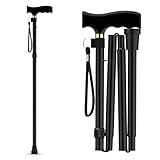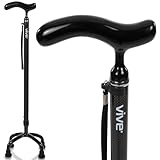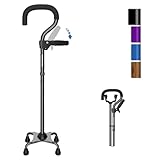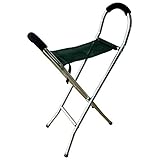One of the most common questions people ask is, ‘Which walking stick is right for me?’ A walking stick can provide balance, stability, and confidence, whether you are recovering from an injury, managing a long-term condition, or simply looking for extra support. With numerous styles and designs available, selecting the right walking stick depends on your mobility needs, the environment, and personal comfort.
This guide explores the various types of walking sticks, key features to consider, and practical advice to help you make the best choice.
Understanding Walking Sticks
Walking sticks — sometimes referred to as canes — are one of the simplest yet most effective mobility aids. They are lightweight, portable, and versatile. The right walking stick doesn’t just help with mobility; it also reduces the risk of falls, improves posture, and eases pressure on joints.
When deciding which walking stick is right for me, start by understanding the different categories.
Types of Walking Sticks
1. Standard Walking Sticks
The traditional straight walking stick offers simple support for balance. They are available in wood, aluminium, or carbon fibre.
- Best for: Light support and occasional use.
- Pros: Affordable, lightweight, widely available.
- Cons: Limited weight support compared to specialist designs.
2. Folding Walking Sticks
These sticks fold into sections, making them compact and easy to carry in a bag.
- Best for: Travel, shopping, and occasional use.
- Pros: Portable, discreet, and convenient.
- Cons: May not be as sturdy as fixed sticks.
3. Adjustable Walking Sticks
Height-adjustable walking sticks allow users to customise fit. They are typically made from lightweight metals.
- Best for: Users needing personalised fit and long-term flexibility.
- Pros: Versatile, adaptable for different users.
- Cons: Moving parts may wear over time.
4. Quad Canes (Four-Prong Walking Sticks)
Quad canes have a four-legged base, providing extra stability compared to standard sticks.
- Best for: People with balance issues or recovering from surgery.
- Pros: Excellent stability, can stand upright independently.
- Cons: Heavier and less portable.
5. Seat Sticks
The seat doubles as both a walking aid and a temporary seat, making it perfect for outdoor events or long waits.
- Best for: Users who need occasional rest when walking long distances.
- Pros: Two-in-one function.
- Cons: Heavier and not suitable for continuous support.
6. Ergonomic and Specialist Walking Sticks
Some walking sticks are designed with ergonomic handles, shock absorption, or special grips to accommodate individuals with arthritis. Others are designed for hiking or outdoor activity.
- Best suited for: individuals with long-term conditions, outdoor walkers, or those experiencing hand pain.
- Pros: Comfortable, tailored support.
- Cons: More expensive than standard sticks.
Key Features to Consider
When asking which walking stick is right for me, keep these features in mind:
- Height – A properly fitted walking stick should allow your elbow to bend at about 15–20 degrees.
- Material – Wood offers classic design, while aluminium or carbon fibre provides lightweight durability.
- Handle Type – Crook, Derby, Fischer, and ergonomic handles all provide different grip styles.
- Tip – Rubber tips provide traction, while ferrules or spiked tips are useful for outdoor terrain.
- Weight Capacity – Check the maximum weight support before purchase.
- Style – From classic wooden designs to patterned folding sticks, style can help build confidence.
Walking Stick Handles Explained
- Crook Handle: Traditional curved design, easy to hang on a chair or arm.
- Derby Handle: Features a comfortable grip, designed for weight-bearing support.
- Fischer Handle: Ergonomic handle that spreads pressure across the palm, reducing hand strain.
- Offset Handle: Angled grip for balance and stability.
Choosing the right handle is just as important as the stick itself when asking which walking stick is right for me.
Matching Walking Sticks to Your Needs
For Occasional Support
A lightweight, standard walking stick is usually sufficient.
For Travel and Portability
A folding walking stick is best for convenience.
For Balance Problems
A quad cane offers additional stability.
For Arthritis or Hand Pain
An ergonomic or Fischer handle provides comfort and reduces strain.
For Outdoor Use
A hiking or seat stick may be more practical.
Correct Walking Stick Fit
The right fit ensures comfort and safety:
- Stand upright in your usual shoes.
- Let your arms relax by your sides.
- The top of the walking stick should align with the crease of your wrist.
If the stick is too short, you risk back pain; if it’s too tall, you may struggle with control.
Buying Tips
- Try Before Buying – Comfort varies depending on handle and design.
- Consider Your Daily Routine – Choose a stick suited to the environments where you spend most of your time.
- Check Adjustability – Especially important if your needs may change.
- Think About Style – A walking stick you feel confident using is more likely to become part of your daily routine.
- Get Professional Advice – Physiotherapists can recommend the right stick for your condition.
Real-Life Scenarios: Which Walking Stick Is Right for Me?
- Occasional use around the house? → Standard wooden stick.
- Travelling frequently? → Folding walking stick.
- Living with arthritis? → Ergonomic handle walking stick.
- Outdoor hobbies? → Hiking or seat stick.
- Recovering from surgery and need stability? → Quad cane.
Caring for Your Walking Stick
- Replace Tips Regularly – Worn-out tips reduce grip and increase the risk of falls.
- Check Adjustments – Ensure height mechanisms remain secure.
- Clean Handles – Hygiene is especially important for long-term use.
- Store Properly – Keep your walking stick dry to prevent wear and damage.
Conclusion
Which walking stick is right for me? The answer depends on your health, lifestyle, and environment. For occasional use, a standard stick works well. If you need extra stability, quad canes are the safest option. Ergonomic designs are ideal for people living with arthritis, while folding sticks are convenient for travel.
By focusing on handle style, height, and comfort, you’ll find a walking stick that improves both safety and confidence.



































